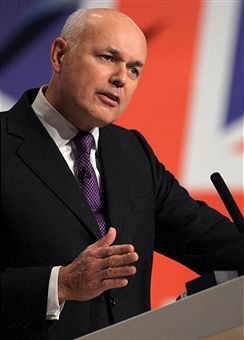 There was a quiet momentousness about Iain Duncan Smith’s speech in Birmingham today
– even before he started speaking. When IDS resigned the Tory leadership in 2003, he could barely have imagined that he would one day address his party as a leading member of the government.
Even a few weeks ago, he couldn’t have been sure that the coalition would implement the policy agenda that he developed during his time at the Centre for Social Justice. Yet here IDS was, receiving
a standing ovation for his efforts. What a difference seven years make.
There was a quiet momentousness about Iain Duncan Smith’s speech in Birmingham today
– even before he started speaking. When IDS resigned the Tory leadership in 2003, he could barely have imagined that he would one day address his party as a leading member of the government.
Even a few weeks ago, he couldn’t have been sure that the coalition would implement the policy agenda that he developed during his time at the Centre for Social Justice. Yet here IDS was, receiving
a standing ovation for his efforts. What a difference seven years make.
And then to the speech itself. Much of it reverberated to the same reforming drumbeat that we’ve heard throughout this Tory conference. “This Conservative-led government has concern for the poor running through its DNA,” IDS intoned, before explaining how his Universal Credit is designed to help the least well-off in society. Echoing George Osborne’s speech from yesterday, he said that, “this is the biggest reform of the welfare system in a generation.” Obstacles aside, it is hard to disagree.
But if all that was unsurprising, then I was mildly taken aback by just how wide-ranging this speech was. At times, it felt more like a overall vision for government and for the Conservatives as a party of social action. For instance, IDS set out his “five pathways out of poverty” – a list that included, “strong, stable families,” “streets that are free of drugs,” and “a school that gives you the skills you need for your future.” None of that is particularly controversial, although watching Lib Dems might have baulked at the frequent emphases on a marriage tax break.
It was not all about the poor, though – even if they are the focus of IDS’s policy agenda. The Tories realise that welfare reform appeals to middle-class taxpayers who feel that the current system is unfairly pitched against them. Hence IDS’s pledge, “I want to look every taxpayer in the eye and be able to say that their money is either going to people who are on the path back to independence, or their money is going to people who, without question, deserve society’s care.” You can expect to hear that message a lot more as universal benefits are pruned to naught.
By way of a conclusion, IDS recounted a visit to a Glasgow council estate where one of the residents claimed that he would simply forget them in time. “That,” he said, “is why I swore to myself there and then that I would put their problems front and centre stage of British politics.” Here was the stage. And here was the quiet man with a loud and important cause.






Comments